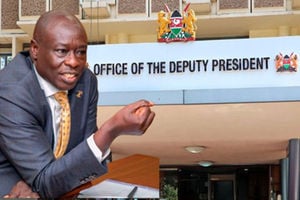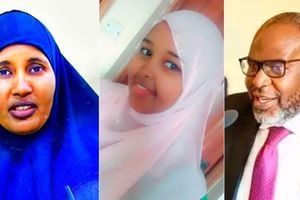Rising voices: Youth demand climate justice

Hashiatu Ibrahim, 18, at the Climate Justice Camp in Arusha, Tanzania on October 8, 2024.
What you need to know:
- Other critical issues targeted are the effects of climate change and gender, how the climate crisis has impacted conflict-prone areas and the vital role the youth can play.
Saustine Lusanzu is full of youthful energy and zeal. We meet the climate justice lawyer in Arusha, Tanzania, where he is among a group of youth advocating for climate change.
Climate clock
Like many other youth involved in climate advocacy, he has decided to take a hands-on approach in the race against time to beat the climate clock.
"Our communities are changing; climate change is seriously affecting farming activities and food security. Tanzania has witnessed severe floods in the recent past. We also witnessed the recent drought that affected the horn of Africa. Seasons are changing and we thus have to take action,” he says.
However, Lusanzu, the founder of EarthCare foundation — a youth-led non-profit organisation dedicated to environmental conservation and climate action in Tanzania — said he faces many hurdles as he pushes for change in the community. "The problem we have is that as youth, we can speak out and present our grievances on the issues affecting us on the ground, but implementation takes a really long time, and this hinders us from moving forward to transform our communities.”
Climate financing has been pointed out as a critical element in the climate conversation.
"Youth need funding, which has been a roadblock to many of us. Once we have the funds, things can run smoothly. We also need to go big on research, and if this space can be created within our respective countries, it will empower us," said Gerance Mutwol, a plastics campaigner from Green Peace Africa-Kenya.

Gerance Mutwol, a plastics campaigner from Green Peace Africa-Kenya, at the Climate Justice Camp in Arusha, Tanzania.
They were speaking during the third edition of the Global Climate Justice Camp in Arusha, which saw 300 young people aged 18 to 35 gather from 100 countries. The young people said they are being short-changed and want to be given a listening ear. "We do not want to be just another check box in the climate conversation. We want to see and bring change, but we cannot do it alone; we need support," stressed Gerance.
For many attendees, the camp served as a wake-up call, driving them to push for local and global action. While many 18-year-olds would be catching up with the changing phases of their lives, Hashiatu Ibrahim, who was a delegate at the camp, is chasing something else; community empowerment.
"I started climate advocacy while I was still in school because I have seen how our land has been destroyed over time. I want to go back and educate my people on the effects of overgrazing and land overuse. I am hoping I will get the support that I need from my government and private stakeholders," she said, echoing the sentiments of many others who are determined to make a difference.
Rafael Ferraz, a participant from Brazil, said the huge challenge that the youth face is lack of support. "It is high time the political class sees the youth as people who can think and bring transformative change to the society. This will ensure that we have a seat at the decision making table.”
Other critical issues targeted are the effects of climate change and gender, how the climate crisis has impacted conflict-prone areas and the vital role the youth can play.
Over time, conflict-prone regions and countries have been subjected to the adverse effects of climate change. This has forced many people to migrate to look for better opportunities as they also run to safe grounds. "Our men have left our women in the villages to go look for greener pastures elsewhere. Unfortunately, even the projects we are trying to initiate in the villages to mitigate the adverse effects of climate change are still in inception stages due to insufficient funding,” said Victoria Sengele, a climate justice lawyer from Tanzania.
Victoria, who comes from a pastoralist community, decried how the lives of many pastoralists in their country have been disrupted due to climate change. This has also been witnessed in Kenya, where many pastoralist communities have been forced to travel further with their herds to find pasture and water.
Agustin Maggio, programme leader of Roots — a climate organisation based in the US — stressed the importance of youth-led initiatives in driving the climate conversation. He noted that in this digital age, many youth can use their social platforms to advocate for change. "We want to speak with one voice as we head to COP29, ensuring that it's not just about ticking boxes to be counted present. We want to make sure that our voice is heard to drive meaningful change in each country represented here,"said Agustin. This collective approach is seen as crucial to advancing global climate goals and ensuring youth participation in decision-making processes.
Less than a month before COP29 takes place, which will have a heavy inclination towards climate financing, all parties are geared to table their demands and to be included in the conversation in Baku, Azerbaijan. While each country is pushing for their representative agenda under their regional blocks to bring the change they need, the youth say they need to be included in the conversation.
The inaugural Climate Justice Camp, held in Nabeul, Tunisia, in September 2022, saw 350 young people from over 65 climate-vulnerable countries come together for a week. The second edition of the camp took place outside of Beirut, Lebanon, in August 2023, with almost 450 participants attending from 100 countries.
In March 2024, the first regional edition of the global camp was held in Sint Maarten, with 120 young community leaders from 25 Caribbean nations in attendance. The outcome from these three camps resulted in the formation of youth delegations at COP27 and COP28. It also led to the establishment of new youth-led non-governmental organisations by participants in their respective countries and the expansion of climate and social initiatives into new regions. The camps have also led to the development of regional and global coalitions and campaigns.




